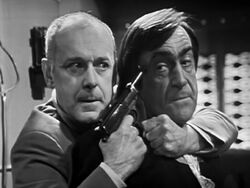 The Doctor Who episode Enemy of the World
The Doctor Who episode Enemy of the World
A central plot element is that the Second Doctor closely resembles a world leader named Salamander. It would have been good to watch the episode to see Patrick Troughton in the two roles, but alas, only one of the six parts survives with video intact.
There are several interesting elements in connection with religion. When the Doctor introduces himself, the question of what sort of Doctor he is comes up. Here’s the relevant bit of conversation:
Astrid Ferrier: Oh, you’re a Doctor?
The Doctor: Well, not of any medical significance.
Astrid Ferrier: Doctor of law? Philosophy?
The Doctor: Which law? Whose philosophies, eh?
Astrid Ferrier: Oh, I see. You’re determined to be mysterious.
The Doctor: Am I?
Astrid Ferrier: Um… Doctor of science?
The Doctor: (tending to Astrid’s wound) Septic spray, that should be right.
Astrid Ferrier: A doctor of divinity, then?
The Doctor: You’ll run out of doctors in a minute.
I love the idea of the Doctor perhaps being a Doctor of Divinity.
Also relevant is the discussion of Salamander as the seeming “savior of the world,” having produced a satellite called “Suncatcher” which concentrates the sun’s rays, allowing for increased crop production. It later turns out that he had tricked some people in an underground bunker into believing that a nuclear war had taken place, and that they needed to stay there, where he had them working machinery that caused natural disasters in the world above when he needed them to.
The idea of twins, one good, one evil, could be connected with LOST and many other science fiction shows which explore the notion of good and evil (as well as the LOST-related novel Bad Twin). But on the theme of good and evil, perhaps the most important moment in the episode is this:
DOCTOR: What you really want me to do is to kill him, isn’t it?
KENT: What else do you do when someone is evil?
It is his penchant for killing that gives Kent away to the Doctor as someone who is himself morally suspect, and not only Salamander.
As I am currently also watching episodes from the Sylvester McCoy era, I have to say that I am enjoying the older ones much more than the relatively recent ones, and “The Enemy of the World” is an absolute gem, and an often overlooked one.
